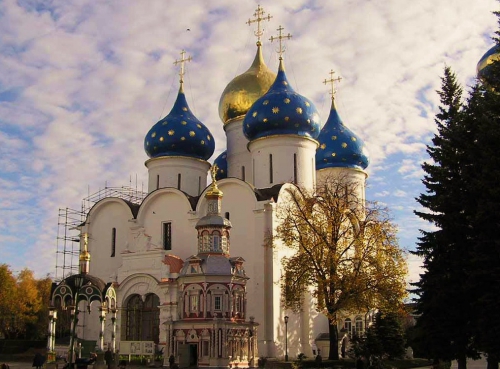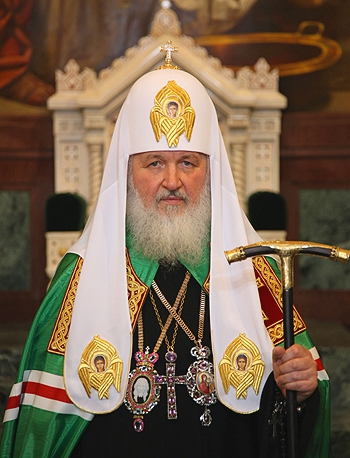The other day on this blog, in a discussion of Team Trump’s dodgy relations with Russian officials, I described Russia as a “hostile foreign power.” Some of you objected to that, saying that Russia is actually friendly. That’s simply not true. I mean, I wish the US and Russia were more friendly, but we are hostile foreign powers to each other. After all, it was the United States that pushed post Cold War NATO to the Russian border. Maybe we had good reasons for that (or not), but there’s no rational way for the Russians to see it other than a hostile act.
In The Atlantic last week, Sigal Samuel wrote about Russian (and Eastern European) anxiety about America’s hostility on the culture war front:
In many Central and Eastern European countries, people are concerned about America’s influence on Russia and on their own nations—and they want Russia to push back, according to a major new Pew Research Center survey.
The results of the survey—released, by coincidence, just hours after Russian Foreign Minister Sergei Lavrov visited the White House and jokedabout Comey’s firing—reveal that in most nations with Orthodox Christian majorities, Russia is seen as an important buffer against the influence of the West. Because the study was conducted between June 2015 and July 2016, before Trump’s election, it does not capture any shifts in public opinion that his administration may have provoked. Still, the survey offers illuminating insights into how America is perceived, and about how those perceptions correlate with religious identity.
But the perception of clashing values goes beyond different economic models. Pheiffer Noble added that there is a widespread sense among Russians that they are safeguarding civilization, be it through the conservative gender norms and sexual norms they advocate, the literature they produce, or the soldiers they send off to war in every generation. “In Russian culture, they have their canon, and their canon is pretty impressive,” she said. “They’ve got Tolstoy and Dostoevsky. They’ve got iconography. They’ve got the idea of suffering as a cultural value—and they feel like they’re also winning at that.”
Sergei Chapnin, the former editor of the official journal of the Russian Orthodox Church, agreed that many Russians feel their country is both integral to European culture and superior to it. (Indeed, 69 percent say their “culture is superior to others,” the survey shows.) “We have a desire to cooperate with Europe and to call Europe an enemy,” he said. “These exist at the same time in the mass consciousness in Russia.” But he also warned that “politicians manipulate” this psychological tension, appealing sometimes to pro-Western feeling and sometimes to anti-Western feeling, in order to serve their own purposes.
Well, sure. But that doesn’t mean the psychological and cultural tensions aren’t real, and important. It’s very difficult for Americans to think of ourselves as anything but bearers of light and goodness to the nations of the world. Along those lines, many of us (especially secular liberals) see resistance to American values — and, more broadly, secular Western values — as a sign of irrational prejudice. The presumption that Western values are universal values is very strong.
These values are globally powerful not so much because they are true (though they may be), but because they are borne by the most economically and culturally powerful nations on earth, especially the United States. Ryszard Legutko, the Polish Catholic political philosopher, writes about how Western liberalism has come to mimic the coercive and unjust ways of the communism it displaced in Eastern Europe. Cultural imperialism is a real thing, and it is no less imperialistic because it hides its aggressiveness from the aggressors. As Legutko puts it, “The liberal-democratic man, especially if he is an intellectual or an artist, is very reluctant to learn, but, at the same time, all too eager to teach.”
When it comes to Orthodox Christianity and Orthodox Christian peoples, many Westerners assume that the Orthodox are just like our Christians, except they use more incense and come in more pronounced ethnic flavors. I used to be this way too, before I entered Orthodoxy in 2006. At that time, a fellow convert in my parish told me to be patient, that it would take at least a decade for my mind to begin thinking like an Orthodox Christian. I didn’t understand that. I thought it would simply be a matter of getting used to a few doctrinal changes, and a different way of worship. Not true. Orthodoxy is not so much a set of propositions as it is a way of being in the world — a way that has for the most part not been conditioned by the experience of modernity, as Western Christianity has.
I’m not here to argue whether that’s a good or a bad thing, though I think it’s mostly a good thing. My point is that Orthodox Christian civilization is meaningfully different from Western civilization, which assumes that liberal individualism is the correct social model.

In the US, for example, our religious culture has been dramatically shaped by Evangelical Protestantism, the Enlightenment, and capitalism — all modern phenomenon that understand religion in individualistic, voluntary terms. Orthodox cultures have a much more traditional form of Christianity and morality, and see religion in far more communal terms — as it was seen in the West prior to the Reformation and the Enlightenment. Patriarch Kirill, the head of the Russian Orthodox Church, has correctly described the basic principle of Western cultural life today as affirming the individual’s freedom of choice, which includes diminishing the role of religion in public life. Kirill continued:
We cannot say that we live in a completely peaceful environment. Today there are battles without roar of guns, and the enemy who threatens us does not visibly cross our borders. However, we are all involved into what the Orthodox tradition calls ‘the invisible battle’. Everyone today is involved in this battle. We are offered a chaos, but we should not be bought by these recommendations and should not participate in the creation of chaos … We are offered sin, a destruction of the moral foundations.
In an academic paper about differences between the West and the Orthodox East on the meaning of human rights, law professor Mark Movsesian has written:
The [Russian Orthodox Church’s social teaching’s] ambivalence about individual rights and its emphasis on the religious community reflect central themes in Orthodox thought, which distrusts Western-style individualism. It is not simply a matter of rejecting the “excesses of individualism” in the matter of Western communitarian scholars. Orthodoxy often expresses discomfort with the very idea of the autonomous individual as a rights-holder. Orthodox thought emphasizes the relational self: a person is defined by relationship to others in the body of the Church. As Daniel Payne writes, “the Orthodox tradition understands the human being ecclesially rather than individualistically.” As a consequence, the tradition has a problem with the idea of individual rights in the Western manner. “[I]f there is any concept of rights in Orthodox political culture,” Payne explains, it is not individual rights, but “group rights.”
Moreover, Orthodox thought conflates religious and national identities in a stronger way than in the West. To be sure, religion can serve as a marker of national and cultural identity in the West as well; consider Italy and Poland. And citizenship in Orthodox countries is not directly tied to religion; as a formal matter, one can be a Russian citizen and not an Orthodox Christian. But religion and nationality are intertwined in a particularly powerful way in the Orthodox world. In Russia, for example, it is a “widely accepted idea”—“shared by politicians, intellectuals and clergy”—that Orthodoxy is the fundamental factor in national identity. Other historical and ethnic factors pale in comparison. The same may be said for other Orthodox countries, like Greece.
This is hard for Westerners — including Westerners like me, who have converted to Orthodoxy — to grasp. I bristle, for example, at restrictions on religious liberty in Russia, in particular on the freedom of minority forms of Christianity. But this is because I have a Westernized view of how religion relates to society. As Movsesian says elsewhere in the same law journal paper (for which there is no link), the Catholic Church’s current teaching on religious liberty is also informed by modernity’s individualism.
My point in this blog entry is not to argue for the superiority of one model over the other. I think both have their strengths and weaknesses. I do want, however, to point out that when Orthodox countries reject liberal Western ideas (e.g., gay rights, religious liberty), they are not necessarily doing so out of bigotry, but because they have a fundamentally different view on what the human person is, what the church is, and what society is. They see the West’s war on their traditions in the name of secular liberalism as an act of aggression — and they’re right. Many of us Westerners regard our actions instead as human rights activism, as fighting for basic liberties against structures of bigotry. But doing so requires accepting the modern Western way of seeing the world as normative — and assuming so is an act of cultural imperialism.
Hey, sometimes cultural imperialism is defensible. It was a very good thing, for example, that the colonizing British in the 19th century put an end to the ancient Indian practice of suttee (widow-burning). Even so, we should practice self-awareness when we are being cultural imperialists, and understand how our cultural hegemony appears in the eyes of other civilizations.
Contemporary America most fundamentally operates on the principle elucidated by Justice Anthony Kennedy in the 1992 Planned Parenthood v. Casey opinion:
At the heart of liberty is the right to define one’s own concept of existence, of meaning, of the universe, and of the mystery of human life.
Leaving aside the legal and philosophical incoherence of this statement, and the coercion it conceals, it is nevertheless an accurate précis of the way Americans think about the relationship between society and religion, or any other source of transcendent meaning. Orthodox countries rightly reject it, because it is profoundly untrue to their own traditions and ways of living. To the Orthodox mind, what Kennedy proposes here is not liberty at all, but a form of bondage. Again, I’m not trying to convince you that the Orthodox view is correct, but only to point out that when Orthodox countries push back against Western “human rights” activists, it is a matter not only of self-defense, but defending themselves against what they genuinely believe to be lies that will destroy the fabric of society.





 del.icio.us
del.icio.us
 Digg
Digg
Les commentaires sont fermés.